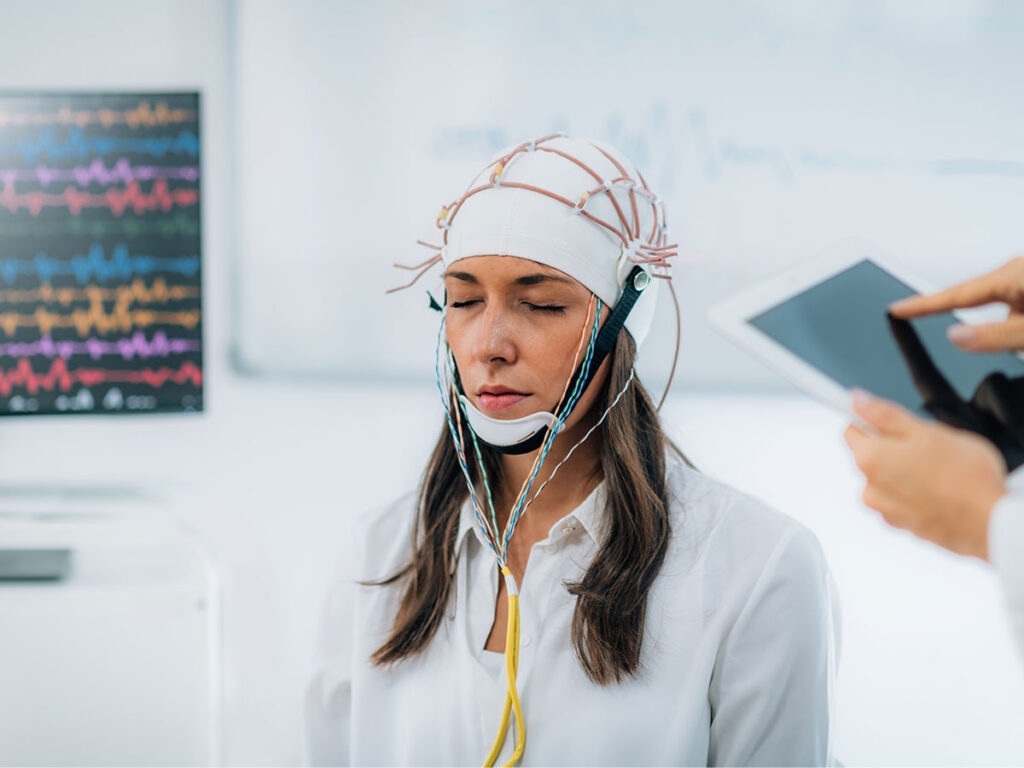“Whether you’re an elite athlete, weekend warrior, or CEO executive, the principles of performance psychology can help you reach your full potential.“
Share Post:

Performance psychology is a rapidly evolving field that has garnered significant attention across various domains, from elite athletics to corporate leadership. By integrating cutting-edge techniques supported by scientific research, individuals can unlock their full potential and achieve peak performance.
In this in-depth exploration, we will delve into four innovative approaches within performance psychology: mindfulness meditation, biofeedback, visualization, and cognitive-behavioral therapy.
By understanding the science and implementing these protocols, you can develop a comprehensive program to enhance your performance in any area of your life.
I. Mindfulness Meditation: Cultivating Clarity and Calm
Definition: mindfulness meditation involves focusing attention on the present moment and being fully aware of thoughts and emotions.
Benefits:
- Stress reduction: Scientific evidence supports the ability of mindfulness meditation to alleviate stress and anxiety, common barriers to peak performance.
- Improved mental well-being: Regular practice can enhance emotional regulation, leading to increased resilience and mental clarity.
Protocols:
- incorporate mindfulness meditation into daily routines, allocating dedicated time for practice.
- Utilize techniques such as focused breathing, body scanning, and non-judgmental awareness.
Application:
- Enhancing focus and concentration during high-pressure situations. Developing a calm and centered mindset conducive to optimal performance.
- Case studies or success stories demonstrating the positive impact of mindfulness meditation.

II. Biofeedback: Harnessing the Power of Self-Regulation
Definition: Biofeedback involves using technology to monitor physiological responses, such as heart rate, breathing rate, and muscle tension.
Benefits:
- Stress management: Biofeedback provides real-time feedback, enabling individuals to regulate their physiological responses and reduce stress.
- Enhanced performance: By gaining awareness and control over bodily functions, individuals can optimize their focus and concentration.
Protocols:
- Utilize biofeedback devices or smartphone applications to track and measure physiological parameters.
- Establish baseline readings and learn techniques to modify these responses.
Application:
- Improving performance in sports, public speaking, or other high-stress activities.
- Developing self-awareness and the ability to self-regulate during challenging situations.
- Real-life examples showcasing the benefits of biofeedback in various contexts.

III. Visualization: Creating a Blueprint for Success
Definition: Visualization involves mentally rehearsing desired outcomes and vividly imagining successful performances.
Benefits:
- Confidence building: Visualization techniques boost self-confidence and reduce performance anxiety.
- Improved performance: By creating a mental blueprint for success, individuals enhance motor skills and optimize execution.
Protocols:
- Set aside dedicated time for visualization practice, ideally in a quiet and comfortable environment.
- Use vivid imagery, engage multiple senses, and focus on desired outcomes.
Application:
- Sports performance: Visualizing successful movements, game scenarios, and achieving personal bests.
- Public speaking: Mentally rehearsing confident delivery and positive audience engagement.
- Real-life examples demonstrating the impact of visualization on performance improvement.

IV. Cognitive-Behavioral Therapy (CBT): Rewiring the Mind for Success
Definition: Cognitive-behavioral therapy involves identifying and modifying negative thought patterns and behaviors.
Benefits:
- Positive mindset: CBT helps individuals develop a more positive and constructive outlook.
- Enhanced self-esteem: Challenging negative beliefs can improve self-perception and boost confidence.
Protocols:
- Identify negative thoughts and behaviors through self-reflection and introspection.
- Utilize cognitive restructuring techniques to replace negative thoughts with positive and realistic ones.
Application:
- Overcoming performance anxiety and self-doubt.
- Managing stress and developing a resilient mindset.
- Examples of individuals who have achieved success through CBT techniques.

Conclusion.
Performance psychology offers a vast array of innovative techniques that can empower individuals in various domains of their lives.
By incorporating mindfulness meditation, biofeedback, visualization, and cognitive-behavioral therapy into a comprehensive program, you can unleash your true potential and achieve peak performance.
Remember, progress is key, and an open-minded approach to new and cutting-edge techniques will pave the way for continuous growth. Embrace the power of performance psychology and embark on a transformative journey to maximize your abilities and reach new heights of success.
Visit Steven’s Optimization Store to get high quality supplements to help you achieve your health and fitness goals.



